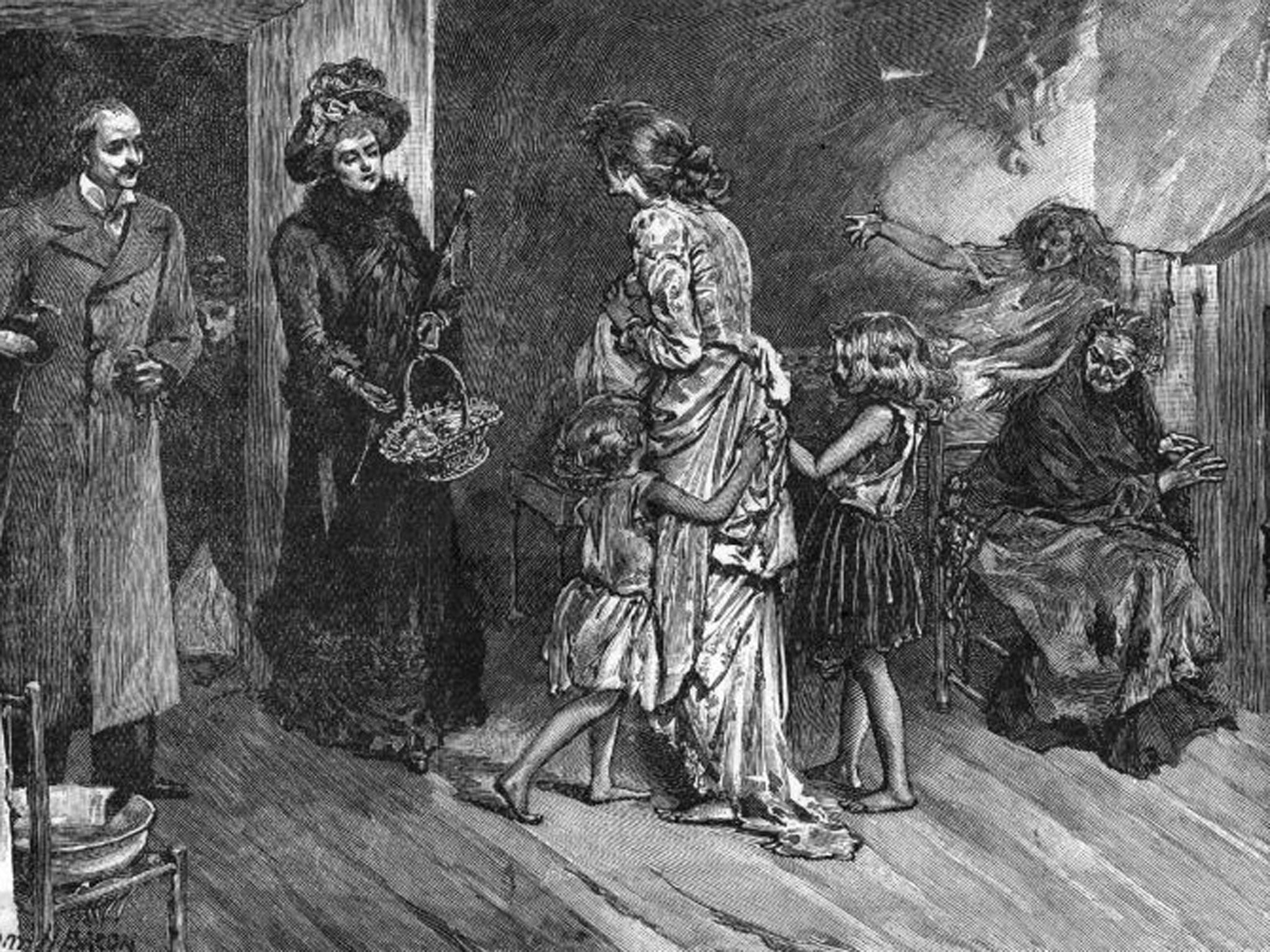Like the poor, rich gawpers will always be with us
Rachel Johnson's 'poverty safari' for a TV documentary is part of a long tradition of well-bred do-gooders discovering that its tough at the bottom of the heap

There is an age-old tradition of elegant and well-bred society women taking a benign interest in the doings of what, in a bygone age, were known as the "lower orders". A century and a half ago, these lady philanthropists paid visits to board schools and subsidised courses in domestic economy. In the 1930s bolder spirits, shepherded into the fray by attentive clergymen, administered soup kitchens in distressed areas: the picture of the countess, her incognito blown by the covering of a fur coat, ladling out broth to the unemployed was a staple of inter-war-era newspaper features.
If nothing else, Rachel Johnson and her "poverty safari", in which so many 21st-century newspaper editors were taking such an unconscionable interest last week, has the advantage of familiarity. Ms Johnson, as the frontwoman of a forthcoming BBC documentary, spent a week living in Deptford, south-east London with a family whose budget for food sometimes did not exceed £1 a day. According to press reports, the experience was a chastening one. Ms J revealed that she was oppressed by a sense of "human waste", compared the existence of some of the people she met to that of battery hens, and suggested that she would never be able to look a £3 cup of coffee in the eye again when so many people living a few miles away from her were barely able to afford a tin of baked beans.
As everybody who writes articles for newspapers is automatically supposed to know everyone else who writes them, I should perhaps say that I have no axe to grind with Ms Johnson, who I have met several times and rather liked, and for whom I used to write a column when she edited The Lady (I was, as it happens, sacked from the column but the responsibility for this misjudgement lay with the proprietor, the legendary Mrs Budworth.) If the spectacle of the Mayor of London's sister slumming it in Benefits City awakens the feeling of disquiet that always accompanies the sight of the well-off wringing their hands in horror at a situation for which the members of their social circle are pretty much responsible, then this isn't to detract from the sincerity of her response.
Meanwhile, back to tradition, in this case not the tradition of the aristocratic lady in the soup kitchen or the distribution to the deserving poor of books with titles like "How to Live Well on Five Shillings a Week", but the tradition of the slumming journalist. If Henry Mayhew (1812-1887) was the originator of low-life reportage, beginning his researches in the mid-19th century, then the early 20th century is crammed with his distinguished descendants. In fact, each successive wave of poverty that broke upon the shores of the British Isles in the post-Victorian period was trailed by a group of reporters anxious to bring news of the accompanying deprivation to the breakfast tables of the comfortably off.

The great Edwardian chronicler was Jack London (People of the Abyss, 1903), to be followed, 30 years later, by Orwell's trip to the unemployment-ravaged industrial north (The Road to Wigan Pier, 1937), Hugh Massingham's account of his excursions in the East End (I Took Off My Tie) and so many trips down coalmines that it was said in the late 1930s that if you threw a stone in the region of the average Yorkshire pithead you would stand a fair chance of hitting someone who was writing a book about workless miners.
The route runs on into the 1960s and 1970s, with the painstaking despatches of Jeremy Seabrook, and has been brought thoroughly up to date by the work of Polly Toynbee. There are several fascinations in this torrent of reportage from shattered hearths, windowless parlours and desperate lodging houses, but chief among them is the question of motive. Naturally, at the top of the list comes the praiseworthy urge to draw attention to a palpable wrong. At the same time, looming into second place beneath it is guilt, the "there but for the grace of God go I …" sub-text that even the most scrupulous and well-meaning reporter can never wholly escape.
Ms Johnson clearly feels more than a twinge of regret that she can afford to send her children to private schools while the Deptfordians flock to food banks. Orwell, meeting a woman from a Sheffield caravan park, recorded that she seemed to feel as he would have felt were he to have been coated in dung.
But to guilt can, inevitably, be added the straightforward pursuit of copy. It is not impugning anybody's motives to say that no journalist, after all, goes anywhere without there being something in it for him or her. Orwell's expedition to the industrial north is sometimes seen as a messianic crusade on behalf of the dispossessed, but the reality is that he went as a jobbing writer in search of a subject, and that he was capable of loading his material against people met on the way to whom he took a dislike. See, for example, the Wigan lodging-house owner Mr Brooker, damned for peeling potatoes into a basin of "filthy water" – as if any liquid into which vegetables are scraped stays spring-pure!
The more thin-skinned journalists of the Depression era sometimes jibbed at the moral position in which they found themselves. Beverley Nichols, one of the best-paid society columnists of the period, once accepted a commission to stay in a Glasgow tenement, only to return south after a week, so convinced had he become that nothing he could write would make the slightest difference to social conditions north of the border.
And yet the truly depressing thing about all these journeys, whether by Orwell, Nichols or anyone else, is that the reader who wants to investigate the history of British poverty is nearly always compelled to resort to middle-class journalists, with their newspaper columns and publishing deals. The name of Jack Hilton, for example, goes almost unremembered by literary historians, but he was a stalwart of the National Union of Unemployed Workers so infuriated by what he imagined to be the misrepresentations of The Road to Wigan Pier that he wrote a travelogue called English Ways (1939), an account of Orwell's journey in reverse, ending up in leafy Epsom.
What we need, three-quarters of a century later, is not so much Ms Johnson talking about her experiences but some working-class Londoners talking about theirs. If her brother could perform one signal service on behalf of the near-destitute, it would be to commission a couple of volumes of oral testimony along the lines of Mayhew's London Labour and the London Poor (1851), so that our conduit to this sink of blighted hopes becomes direct rather than indirect. He could then press the volume into the hands of various of his friends in Government with a hint that the only solution to the current scheme of things is a little redistribution of income and opportunity away from people who have everything to people who have nothing, but clearly this would be a step too far.

Join our commenting forum
Join thought-provoking conversations, follow other Independent readers and see their replies